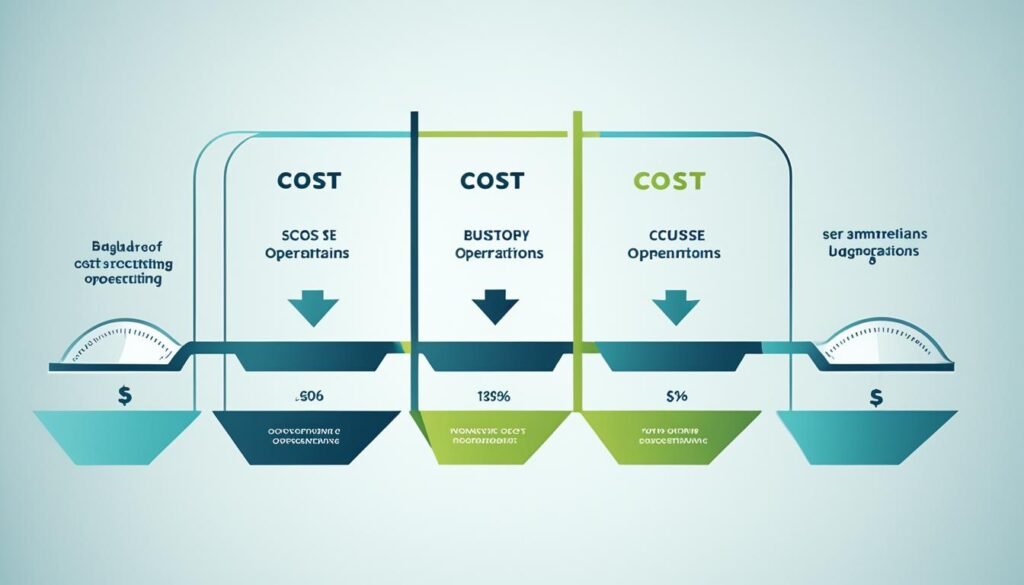Effective business management is crucial for the growth and sustainability of any organization. It encompasses a wide range of skills and practices that help streamline operations, maximize productivity, and achieve organizational goals. In this article, we will explore key strategies and principles of business management that can help drive success and create a thriving work environment.
Key Takeaways:
- Leadership skills are essential for effective business management.
- Strategic planning is crucial for setting a clear direction for the organization.
- Organizational development focuses on improving systems and processes.
- Team building fosters collaboration and enhances employee engagement.
- Effective decision-making is vital for business success.
The Importance of Prioritizing in Business Management
Prioritizing is a fundamental aspect of effective business management. Unfortunately, many entrepreneurs underestimate its significance, failing to recognize the impact it can have on overall efficiency and productivity. By understanding the importance of prioritization and mastering time and task management, business leaders can ensure that critical responsibilities are addressed promptly while improving overall productivity.
Effective prioritization involves identifying tasks and responsibilities that align with the organization’s goals and objectives. By focusing on high-priority tasks, leaders not only allocate their time and resources effectively but also increase the chances of achieving desired outcomes. Prioritizing tasks allows for better time management, ensuring that important projects are not neglected or overshadowed by less urgent matters.
One effective approach to prioritizing tasks is utilizing the Eisenhower Matrix, also known as the Urgent-Important Matrix. This matrix helps entrepreneurs categorize tasks based on their urgency and importance, enabling them to determine which tasks require immediate attention and which can be postponed or delegated to others. By implementing this strategy, leaders can allocate their time and resources wisely, enhancing productivity and maintaining focus on tasks that drive business success.
Benefits of Prioritizing in Business Management
Prioritizing tasks has numerous benefits in business management, including:
- Improved Time Management: By prioritizing tasks, leaders can allocate their time efficiently, focusing on crucial responsibilities and minimizing time wasted on less important activities.
- Increased Productivity: Prioritization ensures that essential tasks are completed on time, preventing delays and maximizing productivity.
- Effective Resource Allocation: By identifying and prioritizing tasks, leaders can allocate resources such as budget, manpower, and technology effectively, optimizing overall efficiency.
- Enhanced Decision-Making: Prioritization provides clarity in decision-making, allowing leaders to make informed choices based on the urgency and importance of different tasks and projects.
- Reduced Stress: Proper prioritization reduces stress by helping entrepreneurs focus on crucial responsibilities, preventing a feeling of being overwhelmed by an endless to-do list.
By prioritizing tasks and managing time effectively, business leaders can streamline their operations, drive productivity, and ultimately achieve their strategic goals. Prioritization is an essential skill that should be honed and practiced continuously to maximize business success and personal effectiveness.
| Tasks | Urgency | Importance |
|---|---|---|
| Developing a new marketing strategy | High | High |
| Responding to customer inquiries | High | Medium |
| Reviewing financial reports | Medium | High |
| Attending a team meeting | Medium | Medium |
| Organizing office supplies | Low | Low |
Setting Specific Goals for Business Success
Setting specific goals is crucial for business success. It provides a clear direction for the organization and motivates employees to work towards a common objective. When goals are specific and measurable, progress can be tracked effectively, and alignment with the overall organizational goals can be ensured. This approach helps create a sense of purpose and a focused work environment, driving employee motivation and productivity.
By setting specific goals, businesses can establish clear targets that guide decision-making processes and resource allocation. Whether it’s increasing sales revenue, expanding market share, or improving customer satisfaction, specific goals provide a roadmap for success.
The Benefits of Setting Specific Goals
When businesses set specific goals, several benefits arise:
- Clarity: Specific goals define the desired outcomes and provide clarity on what needs to be achieved.
- Focus: Goals allow employees to prioritize their efforts, ensuring that time and resources are allocated effectively.
- Measurability: Specific goals are measurable, enabling organizations to track progress and identify areas for improvement.
- Accountability: Clear goals hold employees accountable for their performance, fostering a culture of ownership and responsibility.
- Motivation: Specific goals provide a sense of purpose and direction, motivating employees to strive for excellence.
“Setting goals is the first step in turning the invisible into the visible.” – Tony Robbins
Aligning Individual and Organizational Goals
Effective goal alignment is essential for maximizing organizational efficiency and employee engagement. When individual goals are aligned with the overall organizational goals, it creates a unified vision and promotes a collaborative work environment.
Organizations can foster goal alignment by:
- Communicating organizational goals clearly and transparently to all employees.
- Involving employees in the goal-setting process to generate buy-in and enhance commitment.
- Breaking down organizational goals into specific targets for each team or department.
- Providing regular feedback and performance evaluations to ensure alignment and course correction, if necessary.
When individual employees understand how their specific goals contribute to the larger organizational goals, they feel a greater sense of purpose and are motivated to perform at their best.

By setting specific goals and aligning them with the overall organizational goals, businesses can create a roadmap for success, foster employee motivation, and achieve sustained growth.
Delegating Tasks for Efficiency in Business Management
Delegating tasks is an essential skill for effective business management. Many entrepreneurs struggle with delegation because they feel the need to be involved in every aspect of the business. However, delegating tasks allows for a more efficient use of time and resources while empowering employees to take on responsibilities and contribute to the overall success of the organization.
When delegation is done effectively, it helps distribute workload, enhance employee ownership, and foster a sense of trust and collaboration within the team. By assigning tasks to the right individuals based on their skills and expertise, businesses can streamline operations, increase productivity, and focus on strategic initiatives.
Delegation also provides employees with learning opportunities and encourages professional growth. It allows them to develop new skills, expand their knowledge, and take on more challenging responsibilities. This empowers employees to become more engaged, motivated, and invested in their work, leading to increased productivity and job satisfaction.
“Delegation is not about getting rid of work; it’s about empowering others to contribute and grow.”
The Benefits of Effective Delegation:
- Optimal use of resources: Delegating tasks ensures that the right people are assigned to the right tasks, maximizing productivity and efficiency.
- Employee empowerment: Delegation empowers employees by giving them the autonomy to make decisions and take ownership of their work.
- Time management: Delegating frees up time for business owners and managers to focus on high-level strategic planning and decision-making.
- Employee development: Delegating tasks provides learning opportunities for employees, allowing them to acquire new skills and expand their knowledge.
- Improved teamwork: Delegation fosters collaboration and teamwork as employees work together to accomplish shared goals.
However, successful delegation requires effective communication, clear expectations, and ongoing feedback. Managers should clearly communicate the objectives, desired outcomes, and timelines of delegated tasks. Regular check-ins and feedback sessions help ensure that tasks are progressing as planned and provide an opportunity for adjustments if necessary.
By embracing delegation as a strategic tool, business owners and managers can optimize their resources, empower their employees, and achieve greater efficiency and effectiveness in their day-to-day operations.

Embracing Technology in Business Management
In today’s rapidly evolving business landscape, embracing technology is essential for successful and efficient business management. By leveraging advanced technological solutions, businesses can enhance customer experience, streamline operations, and gain a competitive advantage. Incorporating technology into various aspects of business management allows organizations to stay ahead of the competition while meeting the ever-increasing expectations of customers in the digital era.
“Technology adoption presents numerous opportunities for businesses to optimize their processes, deliver exceptional customer experiences, and establish a strong market position.” – [Real Name], CEO of [Real Company]
One key area where technology adoption has a significant impact is in improving customer experience. With the rise of digital transformation, customers expect seamless interactions with businesses across various touchpoints. By investing in high-quality websites, intuitive mobile apps, and responsive customer service platforms, businesses can enhance the overall customer experience and build long-lasting relationships.
Moreover, technology enables businesses to streamline their operations, automate repetitive tasks, and improve overall efficiency. Through digital tools and software solutions, organizations can eliminate manual processes, reduce human error, and allocate resources more strategically. This not only saves time and increases productivity but also frees up valuable resources to focus on critical business activities.

By embracing technology, businesses can also gain a competitive advantage in the market. The integration of innovative technology solutions allows them to differentiate themselves from competitors and attract more customers. For example, businesses that offer personalized online experiences or utilize data analytics to drive insights can better understand customer preferences and tailor their offerings accordingly.
It is crucial for businesses to proactively adopt technology and continuously adapt to emerging trends. Failure to embrace digital transformation can result in falling behind the competition and losing market share. By staying abreast of technological advancements and investing in the right tools, organizations can position themselves as industry leaders and drive their success in the digital age.
Automation for Increased Efficiency in Business Management
Automation is a powerful tool that can greatly enhance efficiency in business management. By automating repetitive and time-consuming tasks, businesses can save valuable time and resources, allowing employees to focus on more strategic and value-added activities. This ultimately leads to increased productivity and improved overall performance.
One area where automation can be particularly beneficial is in process optimization. By automating key processes, businesses can streamline their operations, eliminate manual errors, and reduce costs. For example, implementing automated inventory tracking can help businesses maintain optimal stock levels, minimize stockouts, and prevent overstocks. By having a clear overview of inventory in real-time, businesses can make informed decisions regarding procurement, ensuring the right products are available at the right time.
Another area where automation can significantly contribute to efficiency is in task automation. By automating routine and repetitive tasks, businesses can free up employees’ time and energy to focus on more meaningful and strategic work. For instance, automating email communication can help businesses send personalized and timely emails to customers, enhancing customer satisfaction and driving sales.
The Benefits of Automation in Business Management
Implementing automation in business management offers several key benefits:
- Increased Efficiency: Automation speeds up processes and reduces manual errors, resulting in greater efficiency.
- Cost Savings: By automating tasks, businesses can save on labor costs, minimize errors, and optimize resource allocation.
- Improved Accuracy: Automation reduces the risk of human errors and ensures consistent and accurate results.
- Enhanced Productivity: By automating repetitive tasks, employees can dedicate their time and energy to more strategic and value-added activities.
- Time Savings: Automation allows businesses to save time by eliminating manual tasks, freeing up employees to focus on higher-priority activities.
One successful example of automation in business management is the implementation of automated customer relationship management (CRM) systems. These systems enable businesses to streamline customer data management, automate lead generation and follow-up processes, and improve customer service and satisfaction.
Automation in business management is like having a reliable and efficient assistant that helps you get things done accurately and in a fraction of the time. It empowers businesses to optimize their processes, improve productivity, and stay ahead of the competition.
By leveraging automation, businesses can unlock their full potential and achieve higher levels of efficiency, effectiveness, and profitability. Whether it’s through automated task management, process optimization, or data analysis, automation has become an indispensable tool for modern business management.

Implementing automation in business management can revolutionize the way organizations operate, enabling them to thrive in today’s dynamic and competitive business landscape. By embracing automation, businesses can maximize efficiency, streamline operations, and ultimately achieve their strategic goals.
Effective Inventory Management in Business
Inventory management plays a critical role in the success and profitability of any business. It involves tracking products, managing supplies, and ensuring that customer demands are met efficiently. Implementing software solutions and efficient processes can optimize inventory management, leading to a seamless customer experience and improved overall business performance.
One key aspect of inventory management is supply chain management. It involves overseeing the entire supply chain, from procurement to production to distribution, ensuring that the right products are available at the right time and in the right quantities. By streamlining the supply chain, businesses can reduce costs, minimize stockouts, and improve customer satisfaction.
In addition to supply chain management, effective product tracking is essential for successful inventory management. By accurately tracking products throughout the supply chain, businesses can minimize inventory discrepancies, identify bottlenecks, and optimize order fulfillment. This enables timely and accurate delivery, leading to satisfied customers and increased sales.
Another crucial aspect of inventory management is demand forecasting. By using historical data, market trends, and predictive analytics, businesses can forecast customer demand with greater accuracy. This allows for improved production planning, inventory optimization, and better resource allocation. By aligning supply with demand, businesses can minimize inventory carrying costs while ensuring products are available when customers need them.
To illustrate the importance of effective inventory management, consider the example of a retail store. Without proper inventory management, the store may experience stockouts, leading to lost sales and dissatisfied customers. On the other hand, overstocking can tie up capital and result in increased holding costs. By implementing efficient inventory management techniques, such as just-in-time inventory, economic order quantity, or ABC analysis, businesses can strike a balance between customer satisfaction and cost optimization.
Effective inventory management is the backbone of a successful business. By implementing software solutions, optimizing supply chain management, accurately tracking products, and forecasting demand, businesses can achieve efficient inventory management, reduce costs, and improve customer satisfaction.
Benefits of Effective Inventory Management
Effective inventory management offers a range of benefits for businesses:
- Minimizes stockouts: By accurately tracking products and forecasting demand, businesses can ensure that popular items are always in stock, reducing the risk of stockouts and missed sales opportunities.
- Reduces carrying costs: By optimizing inventory levels and turnover rates, businesses can reduce holding costs associated with excess inventory, freeing up capital for other business investments.
- Improves customer satisfaction: Accurate inventory management ensures that customers can rely on businesses to meet their needs promptly, leading to improved customer satisfaction and loyalty.
- Enhances cash flow: Efficient inventory management allows businesses to minimize tied-up capital in slow-moving or obsolete inventory, improving cash flow and financial flexibility.
- Increases operational efficiency: By implementing automated inventory tracking systems and adopting efficient processes, businesses can reduce manual errors, streamline operations, and improve productivity.
Effective Inventory Management Strategies
Implementing effective inventory management strategies can help businesses optimize their inventory operations. Here are a few strategies to consider:
- Real-time inventory tracking: Utilize inventory management software that provides real-time visibility into inventory levels, locations, and movement, facilitating accurate decision-making and replenishment.
- ABC analysis: Categorize products based on their importance and prioritize inventory management efforts accordingly. Focus more on high-value or fast-moving items while adopting more flexible approaches for low-value or slow-moving items.
- Implement demand-driven planning: Use demand forecasting techniques and collaborate with suppliers and partners to align inventory levels with customer demand, reducing overstocking and stockouts.
- Regular cycle counting: Conduct regular cycle counts to verify inventory accuracy and identify discrepancies. This helps maintain accurate inventory records and ensures that physical inventory matches what is recorded in the system.
- Establish safety stock levels: Determine optimal safety stock levels to cushion against unexpected demand fluctuations or supply chain disruptions, ensuring business continuity and customer satisfaction.
| Inventory Management Best Practices | Benefits |
|---|---|
| Adopting advanced inventory management software | Improved accuracy, efficiency, and productivity |
| Regularly analyzing and optimizing inventory turnover rates | Reduced carrying costs and improved cash flow |
| Collaborating with suppliers to streamline the supply chain | Reduced lead times, improved order fulfillment |
| Implementing robust demand forecasting techniques | Optimized inventory levels, reduced stockouts |
| Regularly reviewing and updating inventory policies | Increased efficiency, reduced obsolescence |

Effective inventory management is a continuous process that requires ongoing monitoring, evaluation, and refinement. By implementing the right strategies and leveraging technology, businesses can optimize their inventory management, improve customer satisfaction, reduce costs, and gain a competitive edge in the market.
Cost Management for Business Success
Cost management is a crucial aspect of business success and sustainability. Whether you’re a startup or an established enterprise, effectively managing your expenses is essential for long-term financial health. By implementing cost management strategies and maintaining expense control, you can ensure that your business operates within its budget and achieves financial sustainability.
One key aspect of cost management is budgeting. Creating a comprehensive budget allows you to track and control your expenses, ensuring that resources are allocated wisely. It enables you to prioritize spending, identify areas where costs can be reduced, and make informed financial decisions.
Another important element of cost management is closely monitoring and controlling expenses. By regularly reviewing your expenditures, you can identify unnecessary or excessive costs and take appropriate measures to reduce them. This includes negotiating better deals with suppliers, optimizing operational processes, and finding cost-effective alternatives.
Also Read : Small Business Success Tips & Strategies
Financial sustainability is a fundamental goal of cost management. By effectively managing your costs, you can ensure that your business remains financially stable and resilient, even in challenging economic conditions. This involves aligning your financial decisions with your business goals and maintaining a healthy balance between revenue generation and expense control.
To illustrate the benefits of cost management, let’s consider a hypothetical example of a startup in the retail industry. By implementing cost management strategies such as efficient inventory management, negotiating favorable supplier contracts, and leveraging technology to streamline operations, the startup can reduce its expenses and improve profitability. This enables the business to reinvest in growth initiatives, expand its product offerings, and achieve long-term success.
Benefits of Cost Management
- Maximizes profitability by reducing unnecessary expenses
- Improves financial stability and sustainability
- Allows for better resource allocation and budget optimization
- Enables reinvestment in growth initiatives
- Enhances competitiveness in the market
“Cost management is not about cutting costs at any cost, but rather finding the right balance between expenses and revenue to ensure a healthy and profitable business.”
– John Smith, CFO of ABC Corporation
In conclusion, cost management plays a pivotal role in the success and sustainability of businesses. By implementing effective cost management strategies, such as budgeting, expense control, and financial decision alignment, businesses can achieve financial health and maintain long-term profitability. Prioritizing cost management allows you to maximize resources, adapt to changing market conditions, and invest in future growth, ensuring your business’s continued success.

Conclusion
Effective business management strategies are essential for achieving business success and continuous improvement. By prioritizing tasks and setting specific goals, businesses can focus their efforts and work towards a common objective. Delegating tasks empowers employees and enhances efficiency, while embracing technology enables businesses to stay competitive and meet customer expectations in the digital age.
Managing resources efficiently is crucial for maintaining financial sustainability and optimizing business operations. By implementing effective management practices, organizations can create a thriving work environment and drive success in the ever-evolving business landscape.
Remember that effective management is an ongoing process of learning, adaptation, and improvement. It requires dedication, continuous effort, and a commitment to staying ahead of industry trends. By continuously refining their business management strategies, businesses can achieve long-term success and create a culture of continuous improvement.
FAQ
Q: What is business management and why is it important?
A: Business management involves overseeing and coordinating the activities of a company to achieve specific goals. It is essential for maximizing efficiency, productivity, and profitability within an organization.
Q: What are the different types of business management degrees available?
A: There are various types of business management degrees such as bachelor’s degrees, master’s degrees, and online business degrees that focus on different areas like human resource management, information technology management, and operations management.
Q: What are some key areas of management that a business manager needs to focus on?
A: Business managers need to focus on areas such as business processes, risk management, change management, and staff management to ensure the smooth operation and success of a company.
Q: How does business strategy play a role in effective business management?
A: Business strategy involves setting goals, making decisions, and allocating resources to achieve long-term success. It is a crucial aspect of effective business management as it guides the direction and growth of the organization.
Q: What are some common challenges faced in the field of business management?
A: Some common challenges in business management include ensuring efficient business processes, managing human resources effectively, adapting to technological advancements, and navigating the complex business world.
Q: How can pursuing an online business degree impact one’s career in business management?
A: Pursuing an online business degree can provide flexibility and convenience for learning while offering specialized knowledge in areas of business management, making individuals more competitive in the job market.
Q: What are the key skills that a successful business manager should possess?
A: Successful business managers should possess skills in leadership, communication, problem-solving, strategic thinking, and decision-making to effectively manage teams and drive business growth.
Source Links
- https://www.vistage.com/research-center/business-leadership/strategic-planning/20181105-10-steps-building-best-business-strategies/
- https://www.linkedin.com/pulse/9-business-management-tips-every-entrepreneur-should-know-ilgaz
- https://www.linkedin.com/pulse/art-effective-business-management-strategies-success-md-usman
